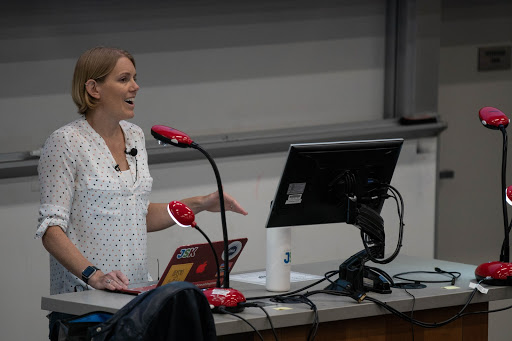If you are a woman working in the media, you have probably come across people asking you what it is like, being and working in the media. I am guessing your answer would be based on your experience.
As you think about this, permit me share this interesting article written by Destiny Alvarez in which four women are sharing their experiences.
https://ijnet.org/en/story/what%E2%80%99s-it-be-woman-media-four-women-share-their-experience
Women have been fighting for equality and their place in the workforce for decades, and while successful in some cases, the battle still continues. For women in media, careful consideration for diversity and actively supporting each other plays a key role in navigating gender normative roles in the workplace.
Each term, the University of Oregon invites leading media professionals and academics to participate in the “Demystifying Media” seminar series, launched in 2016. While the seminar speakers come from a diverse pool of media professionals, the series’ latest term featured four women — a first in the seminar’s history.
Last spring, award-winning data journalist Jennifer La Fleur, journalism professor Dr. Susan Robinson, climate change researcher Rosalind Donald, and McClatchy’s Mandy Jenkins, at the time a JSK Fellow at Stanford, spoke to students and faculty.
Alongside sharing details of their work, they shared their own experiences as women in the media industry. Based on one-on-one interviews, here are some of their key reflections on the opportunities — and challenges — for women in media.
Quotes have been edited for brevity.
Mandy Jenkins, McClatchy

While many journalists abide by the motto “don’t read the comments,” Mandy Jenkins, the General Manager for The Compass Experiment, a local news laboratory founded by McClatchy and Google, said reading and responding to people who care enough to engage with them is an important part of a journalist's job. Engaging is also a key tenet of social journalism, which is using social media to engage audiences, distribute information and more.
“I think the rise of social journalism is very much tied to the rise of women,” said Jenkins. “There are a lot of women that are making big impacts in journalism, but we’re still not seeing that change at the top. I think that’s going to take a lot longer.”
“I have my own theory as to why women are being able to make big leaps in journalism right now,” she added. “At one time women were regulated into arts and community coverage. Later on, for example, when I came into the field, it was all social journalism jobs.”
Jenkins said that when she entered the field, jobs in digital journalism, social media and community engagement were not as sought after and considered “low on the totem pole.” Print was still at the forefront of journalism, so it was easy for women to slip into those jobs and, as a result, women came to dominate those positions.
“Women have been able to rise up through the ranks in these jobs because they used to be ones that no men wanted. With the jobs having gotten bigger, the women in these positions have been getting bigger. A lot of these women are slowly moving into high up positions, like top editor positions now.”
Jenkins visited the University of Oregon as a Journalist in Residence during her time as a 2019 John S. Knight Fellow at Stanford University. During her lecture, she discussed her career and recent research into disinformation and mainstream news.
Rosalind Donald, Columbia University
Rosalind Donald is a former journalist and deputy editor of Carbon Brief, a fact‐checking website focused on climate science and policy in the media. Currently a Ph.D. candidate and researcher at Columbia Journalism School, her work focuses on community understanding of climate change; a topic she argued could be a part of any journalistic beat.
“Reporting on climate change or science can be difficult,” said Rosalind Donald, a former journalist and deputy editor of Carbon Brief and a current Ph.D. candidate and researcher at Columbia Journalism School. “You have people saying you shouldn’t be in this area because it’s a science area. Women in science and in complex fields deal with that every day. It’s not just journalists.”
You can continue reading the rest of the article by clicking here


